The Complexity of the Patent System Speakers: Difference between revisions
From Santa Fe Institute Events Wiki
No edit summary |
No edit summary |
||
| Line 43: | Line 43: | ||
''Professor and Cowan Chair in Human Social Dynamics at the Santa Fe Institute'' | ''Professor and Cowan Chair in Human Social Dynamics at the Santa Fe Institute'' | ||
[[File:Galesic.jpg|left|200px]] | [[File:Galesic.jpg|left|200px]] | ||
Social | Mirta Galesic is Professor and Cowan Chair in Human Social Dynamics at the Santa Fe Institute, and Associate Researcher at the Harding Center for Risk Literacy at the Max Planck Institute for Human Development in Berlin, Germany. She studies how simple cognitive mechanisms interact with properties of the external environment to produce seemingly complex social phenomena. In one line of research, she investigates how apparent cognitive biases in social judgments emerge as a product of the interplay of well-adapted minds and the statistical structure of social environments. In another, she studies how collective performance depend on the interaction of group decision strategies and network structures. A third line of research investigates opinion dynamics in real-world societies using cognitively-enriched models from statistical physics. And, she studies how people understand and cope with uncertainty and complexity inherent in many everyday decisions about health, financial, or environmental decisions. | ||
<div style="clear: both;"></div> | <div style="clear: both;"></div> | ||
| Line 51: | Line 51: | ||
''Department of Economics, Bowdoin College'' | ''Department of Economics, Bowdoin College'' | ||
[[File:Khan.jpg|left|200px]] | [[File:Khan.jpg|left|200px]] | ||
Prof. Khan's research examines issues in law and economic history, including intellectual property rights, technological progress in Europe and the United States, antitrust, litigation and legal systems, and corporate governance. Several papers empirically assess the role of family networks in the mobilization of financial capital during early industrialization. Her work has been recognized by grants of the National Science Foundation; the Leonardo da Vinci Fellowship; and the Griliches Fellewship, which the NBER awards once every two years to an empirical economist. Her book, ''The Democratization of Invention: Patents and Copyrights in American Economic Development, 1790-1920'', received the Alice Hanson Jones Biennial Prize for outstanding work in North American economic history. She is currently working on large-scale empirical projects on the relationship between institutions and technological change, innovation and long-run economic growth. A forthcoming book will analyze the evolution and effects of patent systems, technological prizes and other innovation incentive mechanisms, based on the experience of the U.S. and major European countries from 1750 through 1930. These results are relevant to current debates regarding the efficacy of prizes, and the role of IP and "patent trolls" in the "new economy." The findings have informed policy at such institutions as the World Bank, the Commonwealth Secretariat, and the British Commission on Intellectual Property Rights. | |||
<div style="clear: both;"></div> | <div style="clear: both;"></div> | ||
| Line 59: | Line 59: | ||
''School of Public Policy and Director of Policy Research Services and Principal Research Associate in Innovation Partners, a unit of the Enterprise Innovation Institute, Georgia Institute of Technology'' | ''School of Public Policy and Director of Policy Research Services and Principal Research Associate in Innovation Partners, a unit of the Enterprise Innovation Institute, Georgia Institute of Technology'' | ||
[[File:Youtie.jpeg|left|200px]] | [[File:Youtie.jpeg|left|200px]] | ||
Jan | Jan L. Youtie is director of policy research services and principal research associate in the Economic Development Lab, a unit of Georgia Tech’s Enterprise Innovation Institute. She is the co-founder of the program in Science, Technology, and Innovation Policy; and co-director of the Innovation Co-Lab with Beijing Institute of Technology and University of Manchester. She is the Social and Ethical Implications Coordinator for the Southeastern Nanotechnology Infrastructure Corridor. Dr. Youtie’s research focuses on technology-based economic development, advanced manufacturing, emerging technology assessment, bibliometric and patent analysis, and innovation and knowledge measurement and evaluation. She has been principal investigator in studies sponsored by the U.S. Department of Commerce, National Science Foundation, European Commission, U.N. Development Program, Aspen Institute, Southern Technology Council, and Georgia Research Alliance, among others. Her research received the Lang Rosen Gold Award for best article by the ''Journal of Technology Transfer'', and it also has appeared in ''Research Policy, Economic Development Quarterly'', ''Journal of Technology Transfer'', ''Technovation'', ''Research Evaluation'', ''Evaluation and Program Planning'', ''Nature Nanotechnology'', and many other journals. She has been recognized as one of the top authors in technology and innovation management research by the International Association of Management of Technology. | ||
<div style="clear: both;"></div> | <div style="clear: both;"></div> | ||
Revision as of 21:54, 6 February 2018
March 12 – 14, 2018
Santa Fe Institute
David Krakauer
Santa Fe Institute, President and William H. Miller Professor of Complex Systems
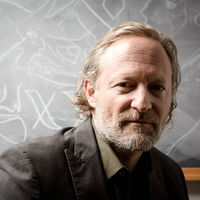
David’s research explores the evolution of intelligence on earth. This includes studying the evolution of genetic, neural, linguistic, social and cultural mechanisms supporting memory and information processing, and exploring their shared properties. He served as the founding Director of the Wisconsin Institute for Discovery, the Co-Director of the Center for Complexity and Collective Computation, and Professor of mathematical genetics all at the University of Wisconsin, Madison. David has been a visiting fellow at the Genomics Frontiers Institute at the University of Pennsylvania, a Sage Fellow at the Sage Center for the Study of the Mind at the University of Santa Barbara, a long-term Fellow of the Institute for Advanced Study in Princeton, and visiting Professor of Evolution at Princeton University. In 2012 Dr. Krakauer was included in the Wired Magazine Smart List as one of 50 people "who will change the World.” In 2016 Krakauer was included in Entrepreneur Magazine’s visionary Leaders advancing global research and business.
Deborah Strumsky
School of Sustainability and School for the Future of Innovation in Society, Arizona State University
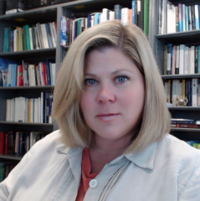
Deborah Strumsky is an assistant professor at Arizona State University (ASU) in Tempe, Arizona. Her research has focused on the study of innovation, invention and technological change, and their relationship to economic growth. Her more recent work has explored technological change in renewable energy systems. She has several longstanding collaborations with researchers at the Santa Fe Institute and a background in complex adaptive systems.
Simon Dedeo
Department of Social and Decision Sciences, Carnegie Mellon University; External Faculty, Santa Fe Institute
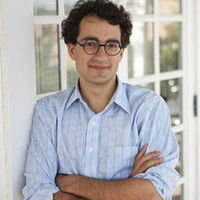
Simon DeDeo is an Assistant Professor at Carnegie Mellon University in the Department of Social and Decision Sciences, and External Professor at the Santa Fe Institute. He is also affiliated with the Cognitive Science program at Indiana University, where he runs the Laboratory for Social Minds. He and his collaborators study how people use words and signals, and the ideas they represent, to create a world. They have studied a diverse set of systems that includes the French Revolution, the courtrooms of Victorian London, the research strategies of Charles Darwin, the insurgency of modern-day Afghanistan, the emergent bureaucracy of Wikipedia, the creation of power hierarchies among the social animals, and the collusions and conspiracies of petrol stations in the American Midwest. They combine data from the contemporary world, archives from the deep past, statistical tools from cosmology, and models of human cognition from Bayesian reasoning and information theory to understand how cultures grow, flourish, innovate, and evolve.
Mirta Galesic
Professor and Cowan Chair in Human Social Dynamics at the Santa Fe Institute

Mirta Galesic is Professor and Cowan Chair in Human Social Dynamics at the Santa Fe Institute, and Associate Researcher at the Harding Center for Risk Literacy at the Max Planck Institute for Human Development in Berlin, Germany. She studies how simple cognitive mechanisms interact with properties of the external environment to produce seemingly complex social phenomena. In one line of research, she investigates how apparent cognitive biases in social judgments emerge as a product of the interplay of well-adapted minds and the statistical structure of social environments. In another, she studies how collective performance depend on the interaction of group decision strategies and network structures. A third line of research investigates opinion dynamics in real-world societies using cognitively-enriched models from statistical physics. And, she studies how people understand and cope with uncertainty and complexity inherent in many everyday decisions about health, financial, or environmental decisions.
Zorina Khan
Department of Economics, Bowdoin College
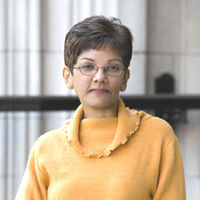
Prof. Khan's research examines issues in law and economic history, including intellectual property rights, technological progress in Europe and the United States, antitrust, litigation and legal systems, and corporate governance. Several papers empirically assess the role of family networks in the mobilization of financial capital during early industrialization. Her work has been recognized by grants of the National Science Foundation; the Leonardo da Vinci Fellowship; and the Griliches Fellewship, which the NBER awards once every two years to an empirical economist. Her book, The Democratization of Invention: Patents and Copyrights in American Economic Development, 1790-1920, received the Alice Hanson Jones Biennial Prize for outstanding work in North American economic history. She is currently working on large-scale empirical projects on the relationship between institutions and technological change, innovation and long-run economic growth. A forthcoming book will analyze the evolution and effects of patent systems, technological prizes and other innovation incentive mechanisms, based on the experience of the U.S. and major European countries from 1750 through 1930. These results are relevant to current debates regarding the efficacy of prizes, and the role of IP and "patent trolls" in the "new economy." The findings have informed policy at such institutions as the World Bank, the Commonwealth Secretariat, and the British Commission on Intellectual Property Rights.
Jan Youtie
School of Public Policy and Director of Policy Research Services and Principal Research Associate in Innovation Partners, a unit of the Enterprise Innovation Institute, Georgia Institute of Technology
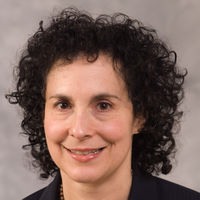
Jan L. Youtie is director of policy research services and principal research associate in the Economic Development Lab, a unit of Georgia Tech’s Enterprise Innovation Institute. She is the co-founder of the program in Science, Technology, and Innovation Policy; and co-director of the Innovation Co-Lab with Beijing Institute of Technology and University of Manchester. She is the Social and Ethical Implications Coordinator for the Southeastern Nanotechnology Infrastructure Corridor. Dr. Youtie’s research focuses on technology-based economic development, advanced manufacturing, emerging technology assessment, bibliometric and patent analysis, and innovation and knowledge measurement and evaluation. She has been principal investigator in studies sponsored by the U.S. Department of Commerce, National Science Foundation, European Commission, U.N. Development Program, Aspen Institute, Southern Technology Council, and Georgia Research Alliance, among others. Her research received the Lang Rosen Gold Award for best article by the Journal of Technology Transfer, and it also has appeared in Research Policy, Economic Development Quarterly, Journal of Technology Transfer, Technovation, Research Evaluation, Evaluation and Program Planning, Nature Nanotechnology, and many other journals. She has been recognized as one of the top authors in technology and innovation management research by the International Association of Management of Technology.
Alan Marco
School of Public Policy, Georgia Institute of Technology

Alan was the second person to hold the position of Chief Economist of the U.S. Patent Office, a position he held until August of this year.
James Evans
Department of Sociology; Director, Knowledge Lab; Program in Computational Social Sciences, University of Chicago

Foremost expert on collective cognition and learning.
Hyejin Youn
Management & Organizations program, Kellogg School of Management, Northwestern University

Expert on the combinatorics of invention, and computational social science.
Jose Lobo
School of Sustainability, ASU–Santa Fe Institute Center for Biosocial Complex Systems, Arizona State University

Colleen Chien
Santa Clara University School of Law

Bio forthcoming.
Brian Hinman
Former Chief IP Officer at Phillips, IBM, Verizon, and Interdigital

Bio forthcoming.

